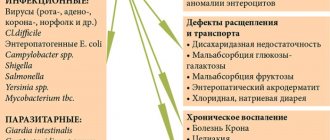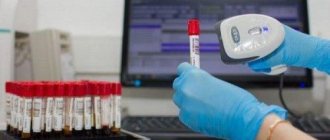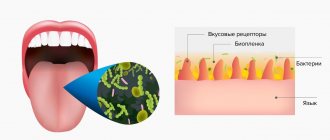Diarrhea in a child that smells like rotten eggs is a symptom that should never be ignored. Diarrhea with odor always indicates the development of diseases in the child’s body, which can be very dangerous and require mandatory treatment.
In addition to the fact that the disease that causes diarrhea can significantly harm the baby’s health, frequent discharge of liquid feces leads to dehydration, which is also a very dangerous condition.
Causes
There are not many reasons why a child has diarrhea with the smell of rotten eggs.
As a rule, bowel dysfunction is associated with viral or bacterial infections and diseases of the large intestine.
Enterovirus
Enterovirus is the general name for a group of pathologies caused by exposure to the Coxsackie virus, echo and polyviruses.
The incubation period of enterovirus infection is 7-10 days, after which the child suddenly develops symptoms of the disease, which include:
- alternation of febrile and subfebrile temperature;
- decreased or lack of appetite;
- lethargy and apathy;
- enlargement of the cervical and submandibular lymph nodes.
If a sign of an enterovirus infection appears, it is necessary to begin urgent treatment, since the condition is often complicated by inflammation in the heart, brain and spinal cord.
Treatment of the disease includes taking antipyretic medications, probiotics, as well as bed rest, eating and drinking.
Be sure to watch the video about this condition
Salmonellosis
Acute intestinal infection caused by the influence of agents of the Salmonella genus on the body.
A child can become infected with salmonellosis through untreated water and thermally untreated food: dairy products, chicken eggs, fish and meat.
The disease in younger patients develops rapidly and acutely.
The first signs of infection are general intoxication, which manifests itself:
- weakness;
- dizziness;
- headaches;
- febrile temperature.
Symptoms of damage to the digestive system include:
- pain in the stomach, in the area around the navel;
- abdominal pain on palpation;
- single (in mild forms) or repeated (in severe forms) vomiting with undigested food particles or bile;
- foamy diarrhea, often mixed with green mucus and a rotten odor;
- dry tongue;
- white persistent coating on the tongue;
- flatulence.
Treatment of salmonellosis should be comprehensive and include the use of antibacterial, enterosorbent and enzyme drugs.
Therapy is also carried out to prevent dehydration.
Putrid dyspepsia
A condition characterized by impaired digestion of proteins and their decomposition in the large intestine.
Putrefactive dyspepsia is a consequence of fast eating, in which the child does not chew food well. Pathology also develops as a result of:
- plentiful protein nutrition;
- decreased secretion functions of the pancreas and stomach;
- intestinal hypersecretion.
Children with putrefactive dyspepsia complain of bloating, belching and diarrhea that smell like rotten eggs and rot, signs of intoxication.
Rotavirus infection
The most common cause of diarrhea in children.
Causes of sour-smelling diarrhea
The most common cause of diarrhea in a child with a bad sour odor is considered to be intestinal infections. Other disorders may also be a provoking factor. These include the following:
- Rotavirus infection . Young children are usually affected by the disease.
- Lactose intolerance . This substance is present in all dairy products. If a child has little enzyme that can break down lactose, milk intolerance develops, which leads to the appearance of unpleasant symptoms.
- Enzyme deficiency . This condition is called fermentopathy. If there is a lack of enzymes, intolerance to sucrose and other substances may develop.
- Intestinal inflammation . These include colitis and enteritis. Due to impaired peristalsis, problems with absorption and other abnormal processes, diarrhea with an unpleasant sour aroma occurs.
- Dysbacteriosis . This is one of the most common causes of this type of diarrhea. The development of dysbiosis is caused by prolonged use of antibiotics.
- Consumption of poor quality food . Unwashed fruits and vegetables can cause problems. But acid diarrhea is also often caused by the consumption of spoiled foods.
How to determine dehydration and what to do?
Dehydration is a dangerous condition that threatens the health and life of a child. Every parent should know how to recognize dehydration and what steps to take to prevent it.
Dehydration develops quickly and goes through 3 stages:
- I - compensated form, which develops with fluid loss of no more than 5% of the child’s weight. Characterized by dry mucous membranes and a feeling of thirst.
- II is a subcompensated form of dehydration, which can be described as a loss of 5 to 10% of the baby’s weight. At this stage, children are capricious and restless. The mucous membranes are distinctly dry, the skin is flabby and also dry. In infants, the fontanel recedes. Urination is rare, urine is dark.
- III - decompensated. Occurs when you lose more than 10% of body weight. The signs of the subcompensated form include cyanosis of the nasolabial triangle, limbs, and pallor of the skin throughout the body. There is no urination, shortness of breath, tachycardia, and often convulsions appear.
To prevent further dehydration (at stage I), you can give the child filtered water, rice water, or dried fruit infusion.
At stage II, it is necessary to give the child water-salt solutions, such as Regidron. You can also prepare a medicinal solution at home - dilute 20 g of sugar, 1 tsp in 1 liter of boiled water. salt and 0.5 tsp. soda
Dilute the prepared solution with clean water in a 1:1 ratio and give it to the child in small portions throughout the day and each time after a bowel movement.
What is diarrhea
Diarrhea is understood as frequent passage of liquid feces, which exceeds 2 times a day. This condition is caused by the rapid passage of intestinal contents. This may be due to increased peristalsis or impaired absorption of water in the intestine.
Typically, this condition indicates the occurrence of diseases of the digestive tract. However, there are many additional symptoms that allow a more accurate diagnosis to be made.
Treatment
Treatment for diarrhea with the smell of rotten eggs in children depends on the cause of the condition.
As a rule, young patients are prescribed drug therapy and diet.
Drug treatment
Only a doctor can prescribe medications that will help relieve a child of diarrhea after a thorough diagnosis.
Depending on the root cause of diarrhea, the baby may be prescribed:
- antibiotics;
- antidiarrheals;
- enterosorbents;
- enzyme preparations;
- drugs that restore intestinal microflora.
Most often used to treat diarrhea in children:
Normobakt
A drug for the treatment of intestinal dysbiosis in children and adults. Recommended for use in children over 6 months.
Contraindicated in case of individual intolerance.
Average price from 400 rubles.
Bifiform
A product for the treatment and prevention of dysbacteriosis, containing lactic acid bacteria. Recommended for children over 2 years old.
Contraindicated for persons with hypersensitivity to the substances included in the drug.
The average price is 600 rubles.
First aid
If a child has diarrhea, the previous menu should be excluded until the stool returns to normal. Remove fatty, fried foods, dairy products, vegetables, and raw fruits from your diet. It is allowed to use activated carbon for children, based on 1 tablet per 10 kg of weight. If diarrhea occurs in a baby, feeding should not be stopped.
Before the doctor arrives, you should prevent dehydration. The child can be given simple purified water and dried fruit compote.
An excellent remedy in the fight against diarrhea will be the pharmaceutical drug Regidron. The solution is diluted with liquid in a 1:1 ratio and consumed throughout the day in small doses.
Further prevention of the condition
To prevent diarrhea due to the strong smell of rotten eggs, it is important to:
- wash vegetables and fruits thoroughly before eating;
- wash your child’s hands with soap every time after a walk, visiting the toilet, and before eating;
- subject meat, dairy products, eggs to thorough heat treatment;
- feed the child only fresh foods that have been stored in the right conditions;
- transfer the infant to normal nutrition in the autumn-winter period.
Diarrhea in a child is an unpleasant and sometimes very dangerous condition.
Diarrhea caused by various reasons most often indicates the development of various infectious diseases in the child’s body, the treatment of which should be carried out as early as possible. A timely visit to a doctor will help not only cope with an unpleasant illness, but also maintain the health of the baby.
Putrid odor of liquid stool
This smelly diarrhea in a child may indicate inflammation of the large intestine. Often, a putrid odor is caused by fermentation processes that appear after eating foods rich in fiber. A person does not feel severe pain or flatulence in the stomach, but the stool stinks.
We recommend: What to do when a child has a stomach ache and diarrhea?
The bowel movements smell rotten due to electrolytes. Often this smell is noted in the absence of food containing fiber and protein. Bowel movements return to normal quite quickly.
In a newborn baby, smelly stool may occur due to poor nutrition of the mother. Eating fatty foods, dairy products, strawberries, sausages, soda, cabbage - all this leads to upset bowel movements in the baby.
Stool smells like rotten fish
If your waste smells like rotten fish and you have loose stools, you are talking about infection with parasites – worms. Rotten eggs (or the smell of hydrogen sulfide) - this indicates active fermentation in the intestines.
A rotten smell coming from feces is a reason to consult a doctor if the symptom persists for several days and is also accompanied by other signs of abnormalities. Sometimes the feces take on the smell of rotten fish. This indicates a helminthic infestation and is also an indication to see a doctor.
Rotten smell of feces
Even if a person is completely healthy, after a bowel movement there is always an unpleasant smell in the toilet. But if suddenly a strong smell of feces appears, then perhaps some diseases are developing in the body, although this is often associated with the food that was consumed the day before. The smell of human waste is formed by gases that are produced during the digestion and breakdown of food.
The most dangerous symptom is the smell of feces, similar to the smell of rotten carrion. This symptom is typical for malignant neoplasms in the intestines, so you should immediately consult a doctor. This may not be the reason, but you should definitely undergo an examination.
Smelly stool and feces are a sign of poor intestinal absorption, gas formation in the abdominal cavity
Stool smells like rotten eggs in an adult
Intoxication of the body can occur through consumption of poor-quality food or inhalation or oral ingestion of toxic substances. For example, if the stool smells like rotten eggs, this is due to carbon disulfide or hydrogen sulfide poisoning. Intoxication is accompanied by severe pain in the abdomen, nausea and vomiting, and fever.
Oily feces with a smelly aroma indicate the decomposition of fats, but if the feces smell like rotten eggs (sulfur), this indicates poisoning with hydrogen sulfide and carbon disulfide.
Rotten smell of stool in an adult and color of stool
An important criterion in determining the disease and the causes of indigestion is what color the stool is:
- Yellow stool that smells like rotten eggs indicates food intolerance or extreme stress.
- Green color may be a sign of the development of dysbiosis, salmonellosis or dysentery. Also, a greenish tint is a consequence of the introduction of new foods into the diet, especially for children.
- White feces are a sign of food oversaturation with carbon and calcium, and can occur with excessive consumption of dairy products.
- Stool that smells like rotten eggs is red, almost burgundy, and occurs when inflammatory processes in the intestines begin and malignant tumors appear.
- The black tint of feces in an infant or an adult is caused by the presence of E. coli and helminths.
For the most effective treatment of a condition in which stool smells like rotten eggs, it is recommended to limit food intake and adhere to a diet. For children and infants, exclude new complementary foods and foods in the diet, replace water with chamomile decoction.







